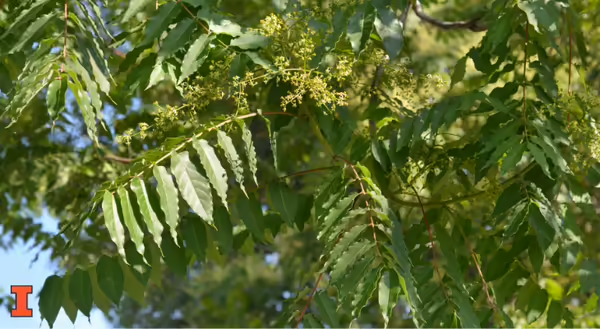
You may have seen the recent headlines about Illinois listing nine more invasive species to the Illinois Exotic Weed Act. But what’s the big deal? And what does this mean for us in Northern Illinois?
What is an invasive species?
An invasive species is an introduced species – often a plant, animal, or insect – that causes some kind of harm. This can be harm to ecosystems, farms, human health (think mosquitoes and ticks!), and more. Sometimes these species were intentionally introduced, such as through the nursery trade. The Callery pear was cultivated to be a compact, ornamental tree. Unfortunately, the supposedly sterile fruits were not, and it began to spread all over roadsides and other disturbed areas. This, in turn, crowds out more beneficial native plants that pollinators and other wildlife depend on for survival, creating a serious threat to our natural ecosystems. Addition to the Exotic Weed Act means these plants can no longer be bought or sold in Illinois.
The list does not require removal of any of the plants on it; however, landowners can help in the battle against invasives by regularly scouting for them. There are a few that are regular uninvited guests here in Northern Illinois. Here are two you might find in your backyard.
Garlic Mustard
In early spring, before the trees have even started leafing out, a little plant pops up under my evergreen trees. It has kidney-shaped leaves and eventually produces small white flowers. When the new leaves are crushed, they have a garlicky smell. Left to its own devices, this single little plant would make thousands of seeds, and in just a few years, there would be an entire stand of garlic mustard. Fortunately, it is easy to pull when caught early. Plants should be disposed of, not composted, as they can still set seed.
Tree of Heaven
Tree of Heaven begins as a small seedling, but eventually spreads through rhizomes, creating a large thicket of itself. Cutting one tree can result in an explosion of more small trees. The easiest way to identify tree of heaven is by crushing a leaf. If it smells like rotten peanut butter, it’s likely tree of heaven. Control of this beast requires assistance from herbicides applied at the correct time. See this resource for more information.
If you would like help identifying potential invasive species in your yard, please reach out to your local Extension office with clear photos. Horticulture staff and Master Gardeners would be happy to help you spot potential problems and identify solutions!
For more information, check out the University of Illinois Extension’s Invasive Species website.